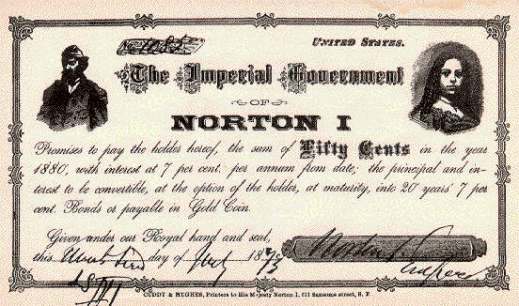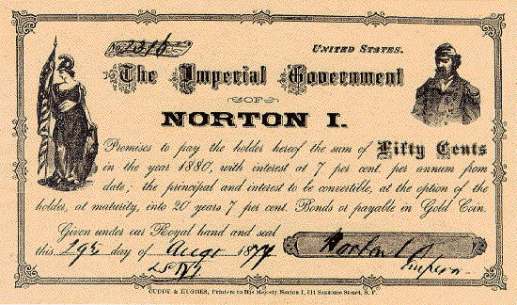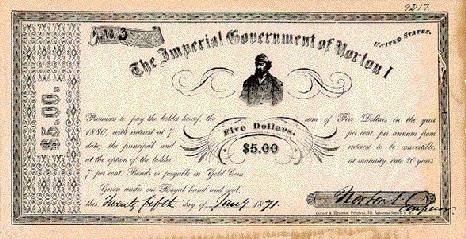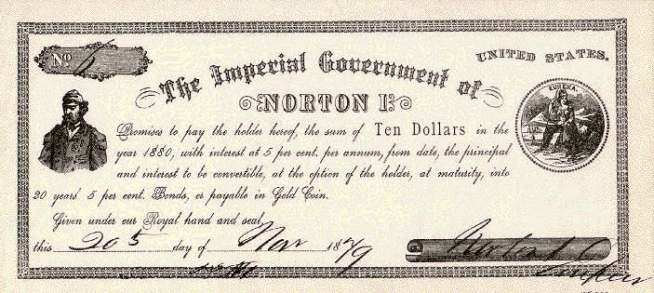| Money is what you can get away with. Money is confidence.
Money is the trust that others imbue in magical pieces of paper.
Scam artists and central bankers know this. Just look at the
shares of Bre-X Minerals. Look at the U.S. dollar and the
Russian ruble. You print the paper, and they give you the goods.
Magic.
Reality is also what you can get away with. Joshua Norton I,
first Emperor of the United States, taught us this lesson.
That's why we love him. He was a sovereign individual who
learned to live free in an unfree world.
Joshua Norton was born in England in 1819. He migrated to
South Africa with his parents, and spent his childhood there.
Not much is known about this period. He then arrived in San
Francisco in 1849, about 30 years of age. That was the time of
the California gold rush. But Norton already had money in his
pockets--in the neighbourhood of $40,000.
While others panned for gold, Norton set himself up with in
the import business, and in real estate, and built a respectable
fortune. It is said to have grown to about a quarter of a
million dollars by 1853.
Then he tried to corner the rice market. He foresaw a large
demand for rice from the many Asiatic workers in the City of San
Francisco. So he bought up as much rice as he could afford. And
the price of rice soared. But Norton held on to his rice hoard
too long. Two ships filled with rice arrived in port. With the
rice supply thus vastly increased, Norton's own rice holdings
became virtually worthless.
Norton went bankrupt and disappeared for a while. Then in
1857 he came out of hiding. He formulated a new plan. On
September 17, 1859, he placed a notice in the San Francisco
Bulletin declaring himself Norton I, Emperor of the United
States. He later added Protector of Mexico to his title.
He also ordered representatives of the various states to meet
in San Francisco's Musical Hall the following February "to make
such alterations in the existing laws of the Union as may
ameliorate the evils under which the country is labouring and
thereby cause confidence to exist, both at home and abroad, in
our stability and integrity."
You had to be there to know what actually went on, but
Norton's reign was uncontested by the states. He began to appear
in public in full military dress. He wore a blue uniform with
gilt epaulets and shiny brass buttons. He preferred a beaver
hat, with a rosette, and topped with peacock feathers. To this
he added a cane and umbrella, or else a ceremonial sword, and
his naturally sovereign bearing.
Thus Norton ruled the streets of San Francisco. On his daily
walks throughout the city, he made certain that all sidewalks
were unobstructed, the police were not sleeping on the job, and
buildings under construction obeyed city ordinances.
He ate in fine restaurants as the guest of the owners, who
vied for his patronage and approval as his fame spread.
Transportation was provided free of charge. At one point the
city provided an annual sum for the Emperor's trappings. He sent
telegrams to other world leaders, who sometimes responded.
Norton issued his own money.




There were the
50 cent notes of 1873 and
1877, the
five dollar bill of 1871, and the
ten dollar bill of 1879, as displayed here.
The citizens of San Francisco gave the Emperor the tribute he
expected. He was listed in the city directory as "Norton, Joshua
(Emperor), dwl. Metropolitan Hotel." He lived in a lodginghouse
on Commercial street. He refused to rent by the week, but paid a
daily rate for 17 years. He had two dogs, Lazarus and Bummer,
who were with him constantly, even in church on Sunday.
When a new dogcatcher took Lazarus into custody by mistake
once, an angry mob gathered to protest, and city officials
quickly announced that both dogs were to have free run of the
city. When Lazarus died, his funeral was attended by thousands.
Norton ensured that proper respect was paid the City in
return. "Whoever after due and proper warning," he proclaimed,
"shall be heard to utter the abdominal word 'Frisco,' which has
no linguistic or other warrant, shall be deemed guilty of a High
Misdemeanour." Penalty for non-compliance was $25.
In July of 1860 Emperor Norton saw trouble brewing between
the North and the South and declared that the Union was
dissolved for the duration of the emergency. In 1869, he ordered
a bridge built across San Francisco Bay, although it would be
sixty years later before the Oakland-San Francisco Bay Bridge
became a reality.
Perhaps Emperor Norton's greatest proclamation appeared in
the San Francisco Herald on August 4, 1869:
". . . [I] do hereby dissolve and abolish the Democratic
and Republican parties, and also do hereby degree the
disfranchisement and imprisonment, for not more than ten,
nor less than five years, to all persons leading to any
violation of this our imperial decree."
The Emperor called for a world of individuals engaged in
creative work. Waiters and busboys were to present lectures, and
philosophers to clean tables. "I could argue all day about the
significance of facing east in religious rituals," Norton said,
"but a clean table is a clean table."
He drew up plans for mile-high buildings, for great
ocean-going balloons propelled by bicyclists, and for a network
of tubes beneath the city to speed postal deliveries. The
records of his many planned enterprises were lost in the great
fire of 1906.
Norton died suddenly on January 8, 1880, while making his
daily rounds. Area flags were hung at half mast. Businesses were
closed. The funeral arrangements were the most elaborate the
city had ever seen, with 20,000 people paying their last
respects.
Emperor Norton, we salute you.
Bibliography
Cowan, Robert Ernest. Norton I, Emperor of the United
States and Protector of Mexico, San Francisco, California
Historical Society, 1923.
Drury, William. Norton I, Emperor of the United States,
New York, Dodd, Mead, 1986.
Kramer, William M. Emperor Norton of San Francisco : a
look at the life and death and strange burials of the most
famous eccentric of gold rush California, Santa Monica,
Calif., N. B. Stern, 1974.
Lane, Allen Stanley. Emperor Norton, the mad monarch of
America, Caldwell, Id., Caxton Printers, Ltd.1939.
Ryder, David Warren. San Francisco's Emperor Norton : the
story of Norton I, Emperor of America and protector of Mexico,
San Francisco, Alex.Dulfer Printing and Lithographing Co., 1939.
The Adventures of Bummer & Lazarus in old San Francisco, a
true story, San Francisco, Londonborn Publications, 1985.
|